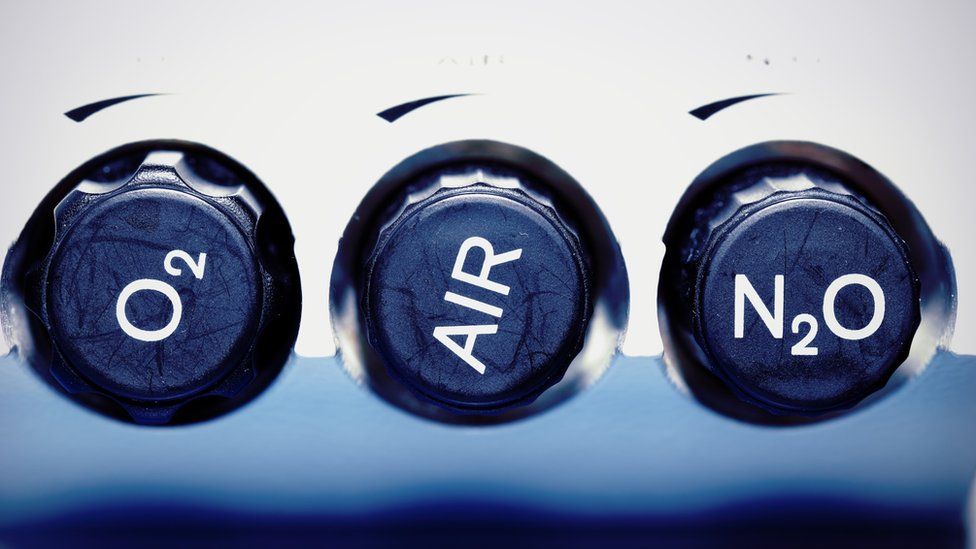Laughing gas can help with distressing memories, research says
- Published

Nitrous oxide - or laughing gas - has the chemical symbol of N2O
Inhaling laughing gas after a traumatic event could help prevent distressing memories from "sticking" in the brain, a University College London study says.
Scenes from a film, depicting rape and murder, were shown to 50 adults. Half spent the next 30 minutes inhaling an equal mix of nitrous oxide and oxygen.
Over the next week, the number of involuntary memories of the film reported by that half declined steeply.
Among the others, the decline was more gradual, Psychological Medicine, external says.
"The day after they saw the film, the number of intrusions experienced by the group who received nitrous oxide fell by over a half," said lead author Dr Ravi Das.
"By contrast, the decline in intrusions was much slower in the group who received air, where there was not a significant drop in intrusions until the fourth day.
"We think that this is because nitrous oxide disrupts a process that helps permanent memories to form.
"If information is 'important' enough to remember, for instance because it produces a strong emotional response, it is 'tagged' for storage.
"The brain requires N-methyl-D-aspartate [NMDA] receptors to tag information during the day, which is then filed for long-term storage while we sleep.
"We know that nitrous oxide blocks NMDA receptors, so could interfere with tagging.
"This might explain why the nitrous oxide group seemed to have weaker memories of the film the day after they watched it."
Laughing gas and the philosopher
In his 1945 work A History of Western Philosophy, Bertrand Russell wrote: "[The 19th Century US philosopher] William James describes a man who got the experience from laughing gas; whenever he was under its influence, he knew the secret of the universe, but when he came to, he had forgotten it. At last, with immense effort, he wrote down the secret before the vision had faded. When completely recovered, he rushed to see what he had written. It was, 'A smell of petroleum prevails throughout.'"
The study also suggested those who felt more "dissociated" after watching the film scenes tended to experience more frequent distressing memories.
Dissociation is a measure of how detached someone feels from a situation and from themselves, and is assessed through a questionnaire.
Signs of dissociation include a:
distorted experience of time
feeling that things are unreal and dreamlike
feeling of disconnection from one's body
These feelings can also induced by inhaling nitrous oxide.
A feeling of dissociation during and after a traumatic event can be a warning sign of post-traumatic stress disorder (PTSD).
Nitrous oxide is regularly used by paramedics and accident and emergency departments.
Senior author Dr Sunjeev Kamboj said: "Many people who end up in an ambulance will have undergone some form of psychological trauma, and our study suggests that the nitrous oxide is likely to be having some effect on how their brain processes it.
"However, whether it helps to prevent symptoms of PTSD or makes them more likely may depend on how dissociated patients feel before they receive it."
Dr Kamboj said further research was now needed to assess memory effects of other painkillers, such as ketamine.
Laughing gas is often used as a recreational drug, but Dr Kamboj said the amount it took to fill a balloon - the most popular recreational method - would probably be "too small to have a noticeable effect on memory formation".
- Published31 July 2015
- Published26 July 2015